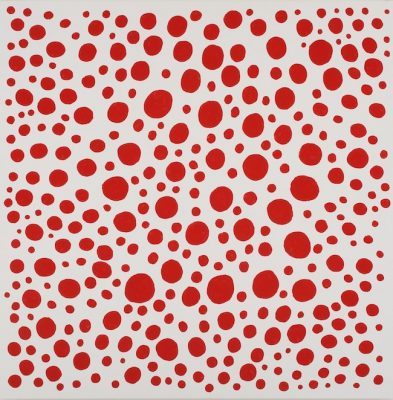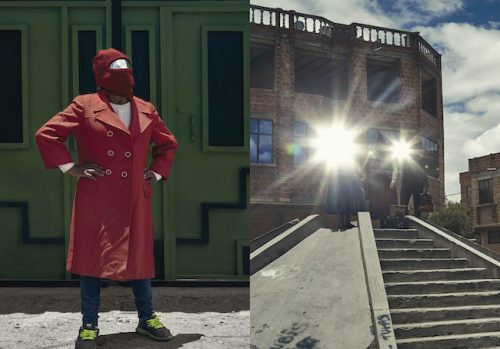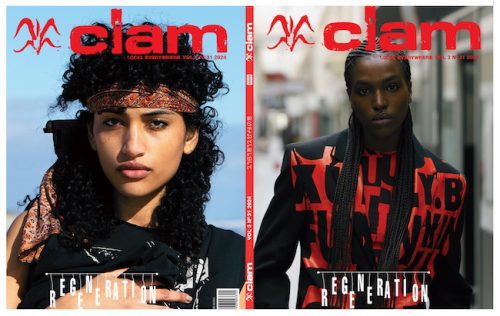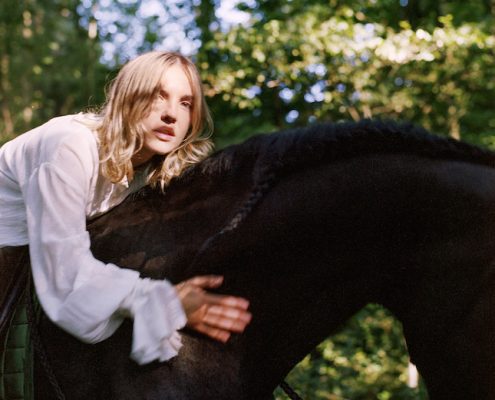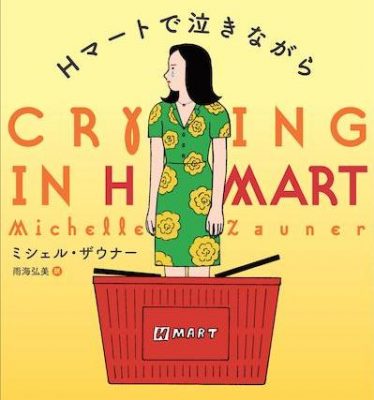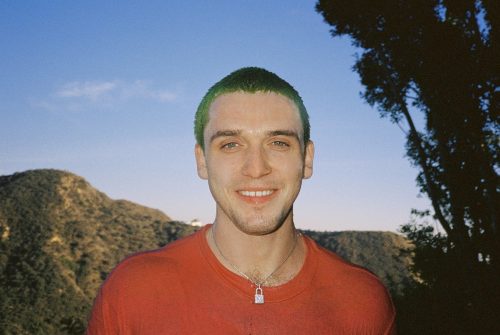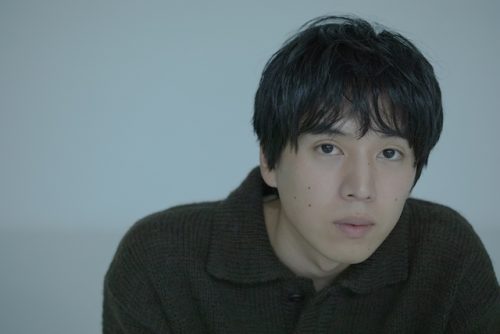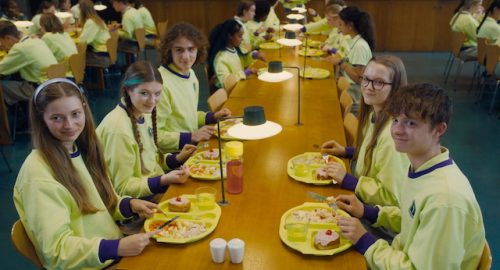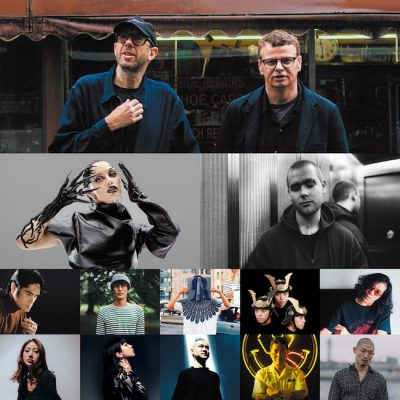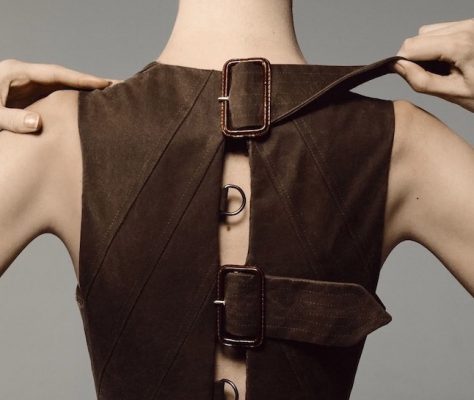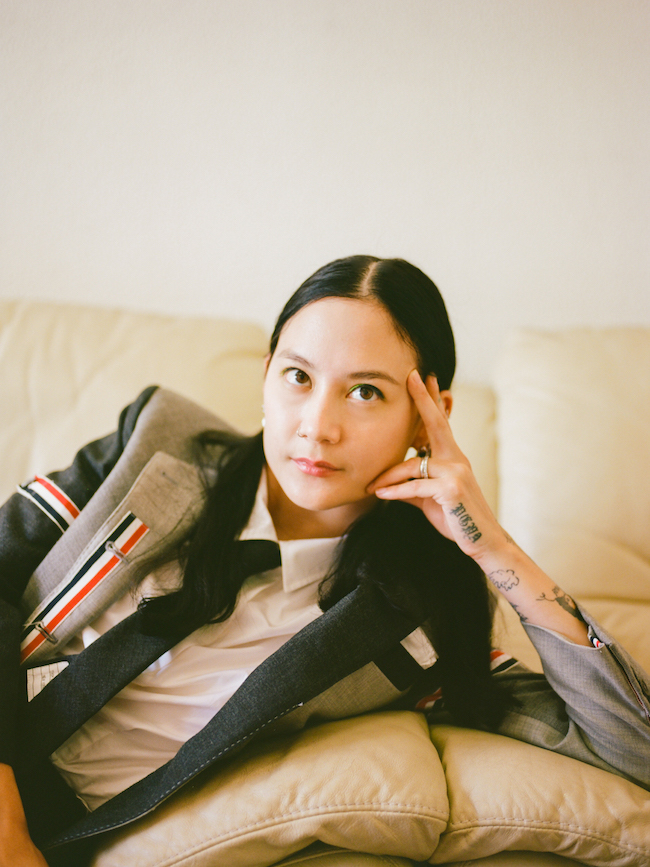
――Your performance at Fuji Rock was great. We saw it online on Youtube and we noticed that you were wearing a top with a dog face. What was the concept behind it?
Michelle : The outfit brand is called nodress. I saw it a long time ago but it’s a small Chinese designer. I thought it was so playful, memorable and funny so it was something that I wanted to wear. In outdoor festivals, I like to wear no sleeves as I get to move around. I thought it was funny.
――Michelle, personally are you into kawaii or cooler and chic style?
Michelle :I think for a long time as a musician, woman musician, I always felt that I needed to dress a little more serious or masculine to be taken seriously. But as I get older, I feel like I have less to prove and I have become more experimental with my style. I think I like both. In earlier times it was something a bit cooler.
――In times when you wanted to prove something when you were younger, what was it that you wanted to prove?
Michelle :I used to be in a band called Little Big League and it was a more punk and emo project. It involved a lot of guitar playing and was more challenging and complicated but my style now is a little more pop and melodic.
――Yesterday, you covered Fee Fi Fo by the Cranberries and in the background, you played video clips of Wong Kar Wai. Was that a special song for you?
Michelle :I listened to a lot of the Cranberries when I was a teenager. I feel that song has been in so many movies. When I was in college I was introduced to Wong Kar Wai films and I fell so deeply in love, I was inspired when I directed the Japanese Breakfast music videos. I just love Faye Wong’s style so much. It was a last-minute decision to play the Cranberries song at Fuji rock. So I was telling our lighting designer, who also does projections, why I decided to cover that song and we watched the trailer together and she said if there is strong enough wifi I can put that video on. It was a last-minute video that can be fun and it seemed to go very well.
I think that my outfit reminded me of her because she has a famous concert outfit where she is wearing a shower curtain dress and you can see her underwear. I think that type of outfit is perfect for the concert because you can be a little bit weirder in your fashion expression when you are a performer. I think that’s why it made me think of her.
――Japanese Breakfast music videos are very cinematic and have a strong plot. You collaborated with video game music as well. In the future would you like to work on movie soundtrack music?
Michelle :I’m not sure if I want to score a movie, but for my “Crying in H Mart” adaptation of my book, I would like to supervise the soundtrack and pick the musicians. Of course, music is important to me so I would love to choose what I would listen to at sixteen, the types of Korean bands I enjoy and what I would have listened to at twenty-five. It is important for me that I get to do that.
One special soundtrack is the Garden State soundtrack. When I was a teenager it was such a big deal to find all these different bands from the Garden State Soundtrack. I would like to do something like that for my movie.
――It’s not your latest record, “Jubilee” was released last year in June, and July. Now that it has been a year, looking back how do you feel about this record?
Michelle :I guess I’m just very proud of how far it has come. I think I knew in my heart that this is my best work. It’s the first time that I released a record with a manager and a full team behind it. So it was amazing to see the response. I also really didn’t intend for the book and the album to come out at the same time as closely together, but I think it was a very unique press cycle because these projects were in conversation with each other.
――In addition to this record, several experiences in the past five to six years had lead you to this place. You may have experienced things for the first time in this process. What were the most surprising experiences?
Michelle :This entire year has been such a big surprise. I come from a very DIY background, and since sixteen years old I did my press, and my booking, played house shows for small venues and toured in a minivan. So it was a very slow route for me. I never expected to tour on a tour bus. I never expected to attend the Grammies or play on SNL. I think in my wildest dreams as a child I never had that ambition so it is all extremely surprising for me.
――Your latest album was about the separation from your mother, and the grief of those moments. Whereas Jubilee was focused more on positivity and joy. I felt that Jubilee came out from those previous records. With the release of the Jubilee album, do you feel a change inside, how do you feel about this experience?
Michelle :I think it is a very natural thing for artists to create a type of self-mythology. After writing those two records, especially after my book, I felt that I said everything I needed to say about that subject. I wanted to write about something that was the opposite of what I was known for. I think as an artist we want to surprise people and do the opposite of what everyone expects of us. To write an album about joy as an indie artist who is expected to be sad all the time, was important to me.
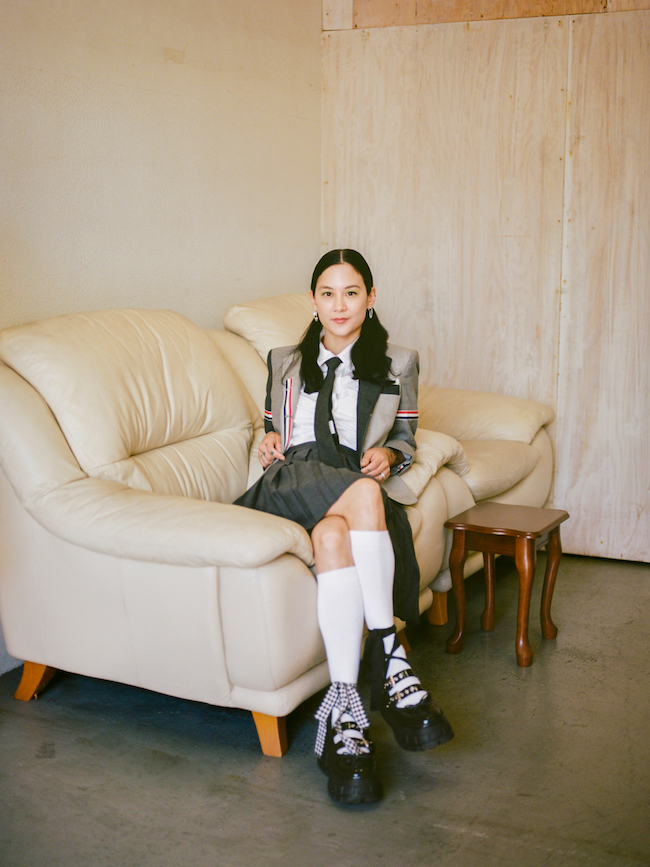
――Jubilee was a great opportunity to change how people think of you. What about the response from people around you, such as your close friends? What have they said about you writing this album?
Michelle :I think they liked it. I don’t often have conversations with my friends about my music. I think they are too afraid.
――Why do you think they are afraid to talk about music?
Michelle :Once you make it it’s done so you don’t want to accidentally criticise the music. I’m sure they like it, but I don’t talk to them as much about it.
――“Crying in H Mart” was released with Jubilee. In the book, you mentioned your mother, where you were from and your identity. Why have you decided on writing that book on these topics?
Michelle :I just felt like I had to. You know I just wanted to make sense of what happened or to express what I saw and experienced, specifically as a caretaker of someone who is dying. It was such a shocking and sad experience for six months, taking care of my mother. I felt very isolated from my peers who had never experienced something like that. It felt very natural for me to try to express this through my art and for the first time an album didn’t have enough words to express and encompass the full feeling.
――You mentioned that you “had to” express those emotions. Why did you feel like that?
Michelle :In six months, my family fell apart. I was the only child and I only have a family of three. I was very close to my mom and everything happened so fast that I couldn’t process it unless I had some project to help me understand that feeling. In terms of identity, I think it was a very unique circumstance being half Korean and having your Korean parent die. Suddenly there was a new question am I even Korean anymore? She’s gone. That was a very unique threat to me that I never heard anyone talk about before about that same kind of experience. So I thought it was an interesting topic to explore and I was certain that other people were looking for that type of conversation.
――You mentioned that you would ideally be a part of “Crying in H Mart” when it is visualized. Have there been any preparations made for this?
Michelle :Not yet. I’m writing the screenplay and I finished the first draft. Right now the studio is making notes, once I complete those notes it can be green-lit, Then we will find out more about it. Whether who is directing or casting. But it is still in the very initial stages.
――We were thinking maybe we can see it next year or the year after but is it too early to say that?
Michelle :I don’t know. I have never done this before so we will see how long it takes.
ーーBeing a half-Korean musician and released a book and albums, there must be so much attention to you in 2021. When you were interviewed, many people assumed you were a representative of an Asian-American opinion. You must have been asked a lot about Asian hate crimes and asked to provide an opinion. How did you feel about this?
Michelle :It was very frustrating. I am very glad to be in this role. A lot of Asian-American especially young girls are very empowered by seeing someone in places like the US where it is a heavily white male-dominated field. I enjoy just being that. I understand with your platforms there is a responsibility to raise that. But I don’t know if I’m a particularly politically intelligent activist. To suddenly be put in a position to be a spokesperson about that is challenging. Especially if you just released an album that is about joy and a book that is about grief and mothers and daughters.
To me, it’s not necessarily an Asian-American story or an Asian-American album. It just is my expression. I don’t think about my identity making this thing. So it’s almost a double-edged sword. It was surprising to me to have a news anchor asking me that kind of question. I was thinking I was going to be asked about my album and I was being asked why Asian hate crime was happening. I’m not the one that is doing it so. It was a real lesson.
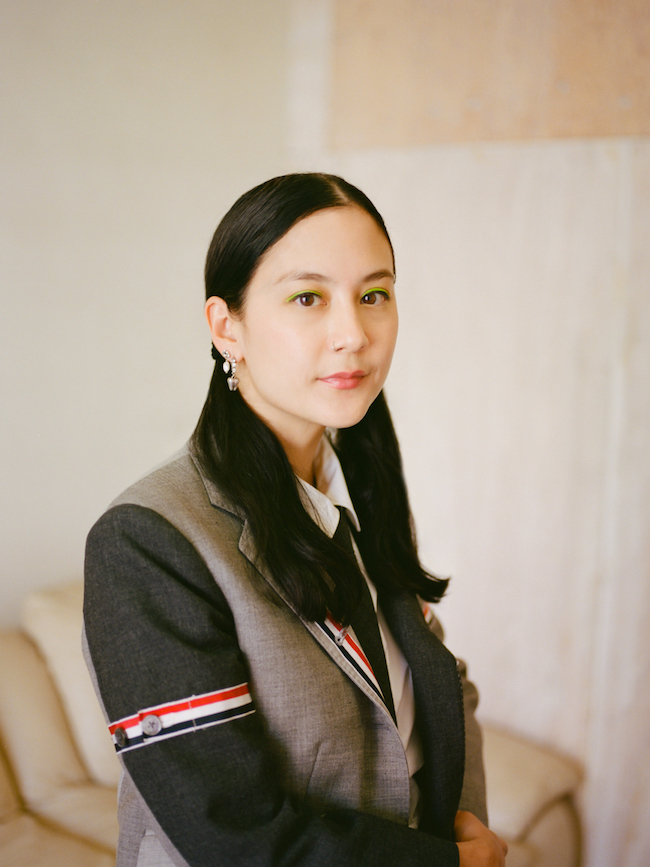
――You didn’t want to be seen as an representative for a culture. You wanted to be seen as an individual artist.
Michelle :Yes. I mean I think that I spend most of my time creating my projects. So I feel very knowledgeable about that project instead of other identities or political issues. If a caucasian man creates a project, he only gets asked questions about his project. He never gets asked questions about political identities. That’s why it is frustrating to have that question in one of them. I feel scared about not being knowledgeable.
――You mentioned that you wanted to be this symbol of empowerment for younger people and pave the way for them to enter the arts. When we interviewed Luna Li, she mentioned that she received big support from you when she was making music and starting her career. How do you feel and what did you do to support her?
Michelle :That’s part of the responsibility I feel having my platform. When I started this project in 2016, Mitsuki was the one who took me on my first five-week North American tour. All of the shows were sold out. It was a huge career break for me. I owe my career in many ways to Mitsuki and I feel very grateful for that. I think Mitsuki is always trying to use her platform to lift artists that don’t have that kind of chance, especially women artists and different races of artists. I admire her for that so I tried to do that with my platform as well.
――Mitsuki and Japanese Breakfast and Jay Som Tour are all doing well in the music scene. In the past five years, they are still doing well but white supremacy is still happening in the indie scene. Do you think that Asian artists are equally seen?
Michelle :I think it is certainly more, I don’t think it is equal. Like Mitsuki has so many fans and I never expected there to be such a variety and I appreciate it. I think it will be impossible to be equal in a way because it’s not reflective of the population.
――Have the response you’ve been receiving give you a sense that it is getting better?
Michelle :Yes, definitely.
――With the Jubille album and the book, you have challenged yourself. From now on what would you like to sing or express? Seeing the responses from people what would be your next step?
Michelle :I think I will continue and try to do the same thing. I want to write another album soon and will write another book in 2024. I also want to move to Korea for one year.
――So you would like to live in Korea for a year, is this for your music?
Michelle :I think I always felt like I wanted to become fluent in Korean. My mother used to tell me if I lived in Korea for six months to a year, I can learn the language. I have a strong base but never enough practice. So I think it would be an interesting book to document the experience of living in Korea for one year and learning the language day by day. Sort of interesting observations. I think by then I would want a break from touring. As I get older it becomes a little more challenging and I want to try something.
――How did your joint project with 1975 came about?
Michelle :I became causal friends with Jack Antonoff, last year through this recording studio called Electric Lady. I did a session there when I moved to New York. We became in touch and he’s a very friendly guy. He invited me to just have coffee one day and we got along together. So it was such a perfect New York dream. He texted me and asked me one day if I liked 1975, and 1975 was one of my favourite bands. So I said yes. I thought they were having a secret concert or something but five minutes later he asked me how fast I can be at Electric Lady. I was in my pyjamas and I took a shower and took a train to Electric Lady and they asked me to sing background vocals on one of their songs. It was so exciting and a crazy surprise. I was so lucky to happen to live in New York.
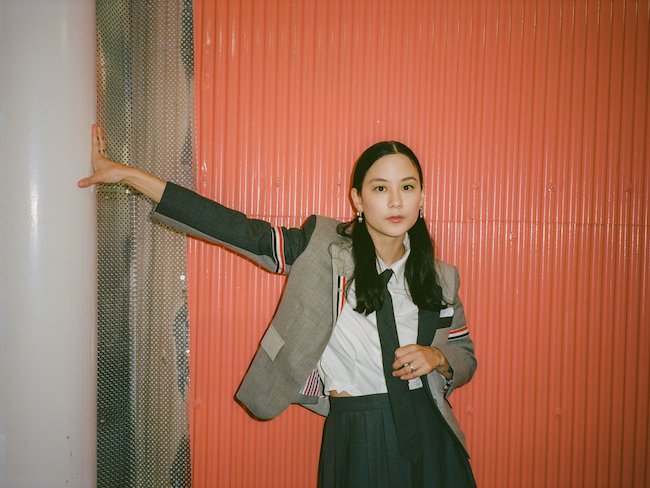
photography Marisa Suda
text Junnosuke Amai




